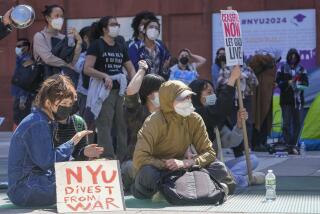150 Cases Found in U.N. Sex Abuse Inquiry in Congo
When Kofi Annan sent investigators in the spring to look into rumors that U.N. officials and peacekeepers were sexually abusing girls in this war-riven nation, he got back some bad news.
Not only were there more than 150 cases of alleged rape and exploitation -- one involving a senior official in charge of security -- there also were pictures and videos of some incidents. And one of the investigators sent here was caught soliciting a prostitute.
Last week, the United Nations secretary-general publicly acknowledged the misconduct, and vowed to halt it and punish those involved.
“I am afraid there is clear evidence that acts of gross misconduct have taken place. This is a shameful thing for the United Nations to have to say, and I am absolutely outraged by it,” Annan said Friday while attending a summit in neighboring Tanzania. He added that he had “zero tolerance” for sexual exploitation and abuse.
The U.N. mission in Congo has 10,800 military personnel supporting a fragile peace pact signed last year after more than four years of fighting, which left at least 2 million people dead, many from hunger and disease. An additional 6,000 peacekeepers are due in coming months.
The U.N. has been struggling with how to handle the allegations since they surfaced earlier this year. In May, Annan’s special representative to Congo, William Lacy Swing, announced that he would investigate Uruguayan peacekeepers accused of having sex with girls at a refugee camp in the northeastern Congolese town of Bunia.
Inquiries turned up dozens more cases allegedly involving girls between the ages of 12 and 15 who would be offered fruit or a piece of cake for sex.
In July, Annan quietly appointed Jordan’s ambassador to the U.N., Prince Zeid Raad Hussein, to look into the charges along with Swing. Zeid, a former peacekeeper who had dealt with similar allegations involving Jordanian soldiers in East Timor, returned from Congo this month and recommended sweeping changes in U.N. operations.
Officials expect more cases to surface. “When you stir the pot, more comes to the top,” Jean-Marie Guehenno, undersecretary-general for peacekeeping, said last week in an interview in Kenya. “But we are sending a message that we will not compromise on this,” he said. If it is a U.N. official, then we will lift his immunity” and press for his prosecution.
The U.N. does not have the power to criminally prosecute its officials or peacekeepers, but it can lift their immunity from prosecution where they are serving. It also can fire or suspend peacekeepers and send them home to face justice.
A French civilian official was expelled from Congo this month and has been indicted in France under a recent law designed to halt sex tourism. Two Tunisian peacekeepers have been deported, and officials from Australia and Haiti are to be sent home soon.
Peacekeepers’ involvement with prostitutes has long been a problem for the United Nations. In 2001, U.N. police officers in Kosovo set up a brothel and a network for trafficking prostitutes. Some governments have asked that U.N. troops be tested for HIV before accepting them.
But the cases in Congo are particularly troubling because they involve allegations of rape and exploitation of girls, and because the accusations extend beyond soldiers to U.N. civilian staff. At least five cases involving mid- and senior-level officials are being investigated, Swing said.
Swing is not allowing accused soldiers to leave Congo until the investigations are complete. U.N. personnel are also being given sensitivity training, and countries that send troops are signing code-of-conduct agreements for their soldiers.
A new investigative team was to arrive in Congo on Monday to look into the situation here. Another team will address allegations in other countries.
“We are giving this our highest priority,” Swing said. “Change has to come from the top.... We have to send the message that this is absolutely not acceptable.”
More to Read
Start your day right
Sign up for Essential California for news, features and recommendations from the L.A. Times and beyond in your inbox six days a week.
You may occasionally receive promotional content from the Los Angeles Times.






